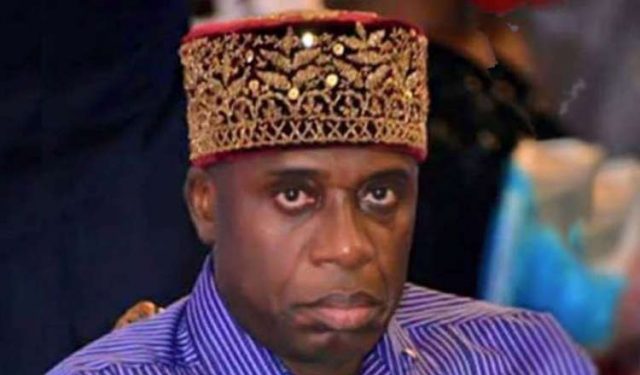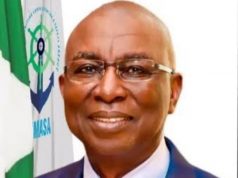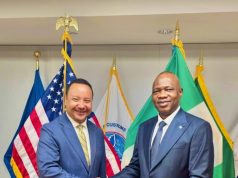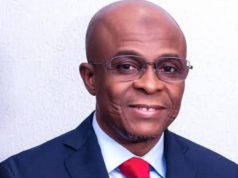The appearance of Chibuike Rotimi Amaechi, Nigeria’s Minister of Transportation, before the House of Representatives Committee on Treaties, Protocols, and Agreements in Abuja recently over Chinese loans could be described as a melodramatic scene of emotional disturbance which affected the audience and victim’s blood circulation in the lining of the nose and throat. Going by the tensive atmosphere one could suspect that the scene affected the glandular secretions hence making their mucous membranes more susceptible. As smart as the honourable minister could said to be, he was really caught between the red sea and the desert of a heated volcanic eruption.
As a big fish in the Nigerian political field, it was certain that the minister made up his mind to say nothing hence he prepared nothing. The minister was prepared to give out nothing and had set the stage for that when he declared prior to the hearing that the lawmakers should back off from asking questions about Chinese loans till December when all the envisaged loans would have been secured. Unfortunately, he did not reckon with Nicholas Ossai, representing Ndokwa/Ukwuani federal constituency, Delta State who is the House chairman of the committee.
The minister was asked on the nature, wordings and terms of the $500 million loan the Federal Government had secured from China for the construction of sections of the Lagos-Kano rail line. The more the chairman of the committee reel out his questions, an increasingly flustered Amaechi could barely mask his irritation. On almost all the issues raised by the committee chairman, the minister had no answer, repeatedly promising to forward the required information on a later date.
Talking about the medium and top-level technical group out of 20,000 Nigerians the minister said have been employed in the railway construction project, there was no proof of the engagement of such a number of Nigerians and he had no data on the number of those at managerial level.
Was the qualifications of the over 560 Chinese nationals brought to Nigeria vetted and certified? Again, the minister had no information on this. Were Nigerians part of the design of the railway project? His response was neither here nor there. What is the local content level of railway projects? To this, Amaechi said the 20,000 he claimed were employed make the local content!
Given that everything about the contract was determined by the Chinese, is there any alternative channel for certifying the cost, and quality of equipment? The minister sarcastically responded that the lawmakers can deploy technical assessors to the project site.
Are the remuneration of the Chinese workers commensurate with their qualification? He had no knowledge of the level of qualification of the 560 Chinese, so he could not determine the appropriateness of their remunerations.
Before the advent of COVID-19, Amaechi had been complaining of delays and lack of seriousness on the part of the Chinese as the project was running far behind delivery schedule, who pays for the time wasted? And what is the cost of training the Nigerian students in China?
But who are the contractors? CCECC, the Chinese construction behemoth. The contractor will be in charge of paying for labour, equipment and materials. That makes the local content issue raised by the national assembly pertinent. How much of the materials will be sourced in Nigeria? How much will the Nigerian workers receive as salaries? Will the feedstock and the wagons come from Nigeria? In other words, how much of the money will be actually spent in Nigeria?
No matter how the executive react to the questions being asked about this loan, there are still more questions the lawmakers still have to ask Amaechi, namely since the money will be controlled by the contractor which is also a Chinese firm, who fixes the salaries of the 560 Chinese working on the rail projects? Who pays for their hotel accommodation in the Oriental, Eko and other luxury hotels where they live? Who fixes the salary of Nigerians working in the project?
It does not require a fortune teller to tell that the money will go back to China while the larger chunk of the remaining will be spent on the Chinese nationals in Nigeria. The salaries, allowances and perks of the Chinese workers are far above that of Nigerians. Some of the mere technicians will suddenly transform to engineers and thus receive huge salaries much of which will be repatriated back to their country. On the other hand, the Nigerian workers who the minister said, are about 19,540 from a simple calculation, may not receive up to 20% of the project’s total wage bill. How many of them are engineers anyway? Are they not only artisans and welders that we see on the way? Even if China gives Nigeria more than twenty years to repay the loan, it has nothing to lose, as their money will still return to them even before the projects are completed. Then, the repayment of the loan and the interest the government is gloating about will be added profit. Again, to Ossai, it was unusual to have an unrecognizable name witness the signing of a major contract and be designated merely as a civil servant. This calls to mind that in his opening remarks at the inquiry, Ossai had doubled down on the charge that due diligence was not observed in the process of accessing the Chinese loan.










